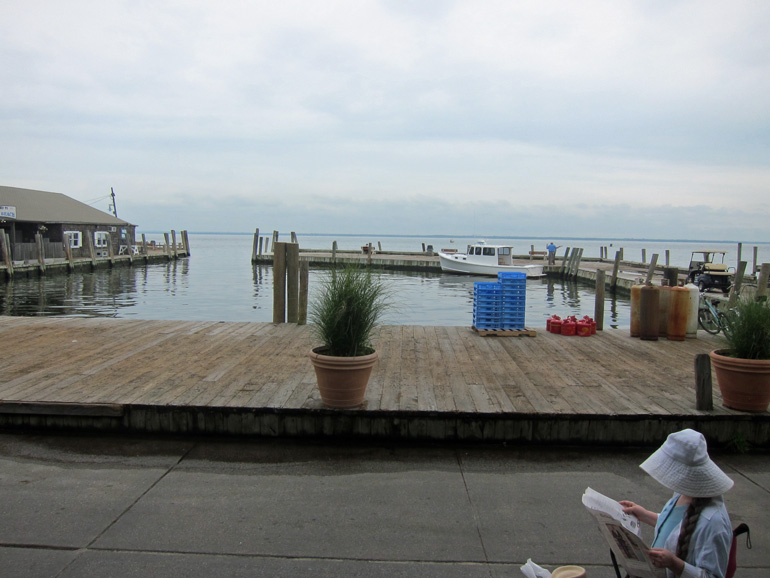Gotham Diary:
No Problem
7 September 2012
Have I already complained about “no problem” as a substitute for “you’re welcome”? Kathleen and I hate it. The otherwise very nice waiter at Magowan’s last night kept saying it. At first, I thought that it wasn’t so much the words as the intonation, which has a bit of Mighty Mouse about it, but that’s nonsense: it is the words. Why introduce the idea of difficulty (if only to deny it) into a response to gratitude? I hope that the vogue passes.
***
It was hard to get out of bed this morning, so I didn’t, not until nearly nine. Although still, the air was cool and pleasant, and the sky was a simple, lovely blue. Nothing was happening. Every now and then, a truck drove through the marsh on Burmah Road. (That’s the stretch of winding sand that we had to traverse, coming and going, when we stayed at Robbins Rest last summer. We can see that house from the deck of this one. It is very inconspicuous among the other rooftops.) There were birds, I suppose. The chirping of insects that might have been tinnitus. My resolve, to get up early and get to work, was utterly vitiated by the tranquillity of dozing next to Kathleen.
Insofar as I was bothered by actual thoughts, they mostly had to do with Orley Farm, which I finished last night. It seemed to me, this morning, that Trollope leaves most of his narratives up in the air. What sort of career does Felix Graham, so obviously not cut out to be a predatory cross-examiner, pursue? What becomes of Mrs Mason of Groby Park — does she die as meanly as she lived? Do the daughters marry well, or at all? Sophia Furnival, pursued by two suitors during the novel, is left high and dry, spurning one and spurned by the other. She is undoubtedly meant to be seen in the same light as the hunting Miss Tristrams: too something-or-other to be properly feminine. (Peregrine Orme says of Harriet Tristram, “I wouldn’t have her if she owned every fox-cover in the county.”) And what really happened to Dockwrath in the end? “What the attorney did to make it necessary that he should leave Hamworth, I do not know…” Piffle! The ending of this voluminous novel is so unfinished that I almost wish that it had ended with this (it is the end of Chapter LXXVII):
I am inclined to think, that upon the whole the company in Great St Helen’s became more happy as the conviction grew upon them that a great and mysterious crime had been committed, which had baffled two courts of law, and had ast last thrust itself forth into the open daylight through the workings of the criminal’s conscience. When Kantwise had completed his story, the time had come for Mrs Loulder to descend to the lower regions, and give some aid in preparation of the supper. During her absence the matter was discussed in every way, and on her return, when she was laden with good things, she found that all the party was contented except Moulder and her brother.
“It’s a very terrible thing,” said Mrs Smiley, later in the evening, as she sat with her steaming glass of rum and water before her. “Very terrible indeed; ain’t it, John? I do wish now I’d gone down and see’d her, I do indeed. Don’t you, Mrs Moulder?”
“If all this is true I should like to have had a peep at her.”
“At any rate we shall have pictures of her in all the papers.”
When I read Orley Farm the first time, I was in my late forties; this time, in my mid-sixties, I found myself in much greater sympathy with Sir Peregrine Orme. I could still see that his retired country life allowed him to persist in naive wishful thinking about his well-behaved neighbors, but I didn’t find him stuffy. No doubt I have become almost as stuffy myself.
It has been like spending the weekend at the country house of a beloved relative who happens to be a “character.” Frequent visits would be maddening, but, every once in a while, it’s very entertaining to drop in and watch the old man go on about things. Uncle Tony is droll (intentionally and otherwise); he is so opinionated that he seems to have opinions on matters about which he insists that no one ought to have an opinion; and he is a transcendant snob, an almost bigoted believer in the ennobling effects of gentle birth. He’s tremendously romantic about “Old England” — the hunt, Tudor architecture (rarely so labeled), the Inns of Court, and such rural inconveniences as make what is a very short walk from Orley Farm to The Cleeve a very long ride in a carriage. His ideas about nubile girls, while utterly consistent with the most rigorous moral precepts, seem almost pervertedly interested, and of course women have but one purpose in life, which is to take care of men. And he is always interrupting his stories with bald statements of his personal views. By Sunday afternoon, you’re packed and panting for a lift to the train back home. But you’ll be back.
I’d forgotten than stern, self-righteous Lucius Mason winds up in Australia. Perfect.

